Who We Are
The Water Resilience Collaborative (WRC) is a consortium of interdisciplinary researchers and extension leaders at Iowa State University collectively and collaboratively working towards advancing water security and resilience throughout the urban-rural continuum. The mission of the initiative is to support world-class research, extension, and education in water sustainability that ensures equity for all people and care for natural and managed ecosystems.
The United Nations defines water security as “the capacity of a population to safeguard sustainable access to adequate acceptable quality water for sustaining livelihoods, human well-being, and socio-economic development, for ensuring protection against water-borne pollution and water-related disasters, and for preserving protection against water-borne pollution and water-related disasters, and for preserving ecosystems in a climate of peace and political stability.” Our collaborative has grown from the water Security Initiative dedicated to these ideals. We are supported by ISU donors, ISU Extension and Outreach, and the College of Engineering.
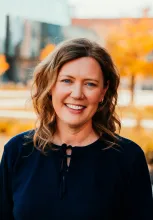
Sara Winnike McMillan, PhD, PE
Director
Sara is a Professor of Agricultural and Biosystems Engineering at Iowa State University. She is also a Professional Engineer, with expertise in ecological restoration and stormwater management. Sara's research focuses on how humans impact water quality in rivers, lakes, and wetlands, and how climate change will affect access to clean water, sustainable food production, and healthy ecosystems. She uses lab and field-based techniques along with modeling tools to develop solutions to environmental problems. Her current research focuses on restoring ecosystems to improve water quality including projects on green infrastructure, sustainable agriculture, and river restoration.
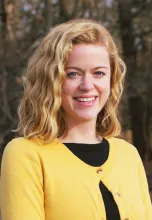
Catherine DeLong
Extension Lead
Catherine DeLong is the Water Quality Program Manager for Iowa State University Extension and Outreach, working statewide to connect people, resources, and ideas on water quality. She helps Iowans understand their role in shaping the future of Iowa’s water while bridging the gap between researchers, practitioners, and the public. With a background in soil science and agricultural policy, she has experience at all levels of conservation, from county-level Soil and Water Conservation Districts to an international nonprofit serving conservation professionals.
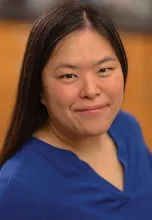
Kaoru Ikuma
Research Lead
Dr. Kaoru Ikuma holds a Ph.D. in Civil and Environmental Engineering from Duke University and degrees in Environmental Sciences, Biochemistry, and Biology from Virginia Tech. Her research focuses on environmental microbiology and biotechnology, including the biodegradation of hazardous contaminants and sustainable water treatment. Committed to water security and environmental justice, she works to develop innovative solutions for equitable access to clean water and sustainable practices.
Leadership Team
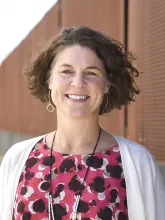
Erin Olson Douglas
Erin Olson-Douglas is the program director for Iowa State University Extension and Outreach’s Community and Economic Development (CED) unit and associate dean for extension and outreach in ISU’s College of Design. A native Iowan and ISU alum, she previously served as director of development services for the City of Des Moines, leading efforts to expand downtown housing, including affordable options. With architecture degrees from ISU and Harvard, Olson-Douglas is passionate about using research and education to benefit Iowa communities statewide.
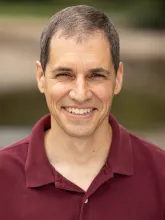
Chris Rehmann
Chris Rehmann’s work in environmental fluid mechanics seeks to build models of flow, mixing, and transport in natural and engineered systems. His research has employed laboratory experiments, field measurements, and numerical simulations to study mixing in rivers, lakes, oceans, and groundwater. He has applied his knowledge of mixing and transport in interdisciplinary collaborations involving the fate and transport of zebra mussel larvae, pathogens, and antibiotic resistance genes in rivers. Several of his recent research projects on stormwater and flooding have been driven by the idea that no one community should disproportionately bear the burden of contamination or a lack of clean water.
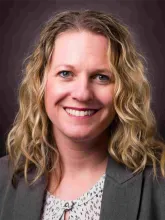
Michelle Soupir
Dr. Soupir’s research focuses on sustainable water systems, including nonpoint source pollution control, watershed management, and water quality monitoring. She studies pathogens, nutrients, and contaminants like antibiotics and antimicrobial resistance in surface and groundwater. Her work develops conservation practices to reduce pollution, improve water quality, and limit public exposure to contaminants from agricultural practices like manure application.
